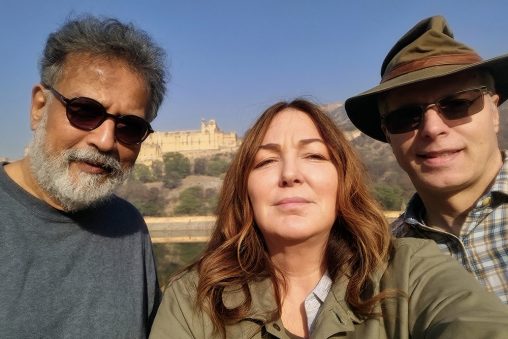
Tushar Gandhi, left, Terry Oroszi, associate professor and vice chair of the Department of Pharmacology and Toxicology at Wright State, and David Ellis, adjunct faculty member in pharmacology and toxicology.
Faculty members from the Wright State University Boonshoft School of Medicine toured India over winter break, guided by no less a figure than the great-grandson of Mahatma Gandhi, widely praised for his philosophy of nonviolent protest that has inspired civil rights leaders worldwide.
Terry Oroszi, Ed.D., associate professor and vice chair of the Department of Pharmacology and Toxicology and director of the Pharmacology and Toxicology Graduate Program, and David Ellis, Ph.D., an adjunct faculty member in pharmacology and toxicology who earned his doctorate degree at Wright State, joined a small group of scholars from around the world that toured several historic Gandhi-related sites and women-run nongovernment organizations that follow the Gandhian philosophy across India.
It started when Brian Polkinghorn, Ph.D., the executive director of the Bosserman Center for Conflict Resolution at Salisbury University, came across Oroszi’s work on violent extremism. Oroszi’s research overlapped with the work of Arun Gandhi, Gandhi’s grandson.
Polkinghorn said in a letter to Oroszi: “I strongly believe, and see a direct connection between, your research on violence and terrorism with that of Dr. Gandhi’s work. Your studies focus on similar topics although, thankfully, they target different audiences and use slightly different methods. Moreover, I think exploring the link between rural health and medical provision would be an excellent topic for us to investigate together. Your expertise and personal interest completes the team.”
Arun Gandhi became ill and could not lead the tour. He was replaced by his son, Tushar Gandhi, president of the Gandhi Foundation, an expert on social development and sustainable communities, and author of several books related to his family.
One location they visited was the cremation site of Gandhi, Raj Ghat. This is where the group participated in the Flame of Hope initiative, originally lit amid prayers at Pope Francis’s Mass in Japan, then blessed by the Dalai Lama. The next stop, Raj Ghat, at the Eternal Flame of Mahatma Gandhi, represents Gandhi’s teaching of nonviolence, tolerance and ethical values. This flame was used to relight the Flame of Hope.
“This was both an educational and philanthropic tour,” Oroszi said. “We had the distinct honor of intimately learning about the history and modern socio-economic principles of Gandhian philosophy directly from a descendant of Gandhi.”
Oroszi and Ellis secured a pledge by Tushar Gandhi to visit Wright State in 2024 to speak on how Mahatma Gandhi influenced the Rev. Dr. Martin Luther King Jr.’s campaign for human rights.
Oroszi is also working with Gandhi and several Wright State faculty to offer global experiences for faculty and students in the Boonshoft School of Medicine and the School of Professional Psychology who are interested in health care.
Because of a memorandum of understanding between Arun Gandhi and Wright State Provost Amy Thompson, Ph.D., this educational opportunity can continue.

 Wright State alum Lindsay Aitchison fulfills childhood space-agency dream
Wright State alum Lindsay Aitchison fulfills childhood space-agency dream  Wright State business professor, alumnus honored by regional technology organizations
Wright State business professor, alumnus honored by regional technology organizations  Wright State University Foundation awards 11 Students First Fund projects
Wright State University Foundation awards 11 Students First Fund projects  Gov. DeWine reappoints Board Treasurer Beth Ferris and names student Ella Vaught to Wright State Board of Trustees
Gov. DeWine reappoints Board Treasurer Beth Ferris and names student Ella Vaught to Wright State Board of Trustees  Joe Gruenberg’s 40-Year support for Wright State celebrated with Honorary Alumnus Award
Joe Gruenberg’s 40-Year support for Wright State celebrated with Honorary Alumnus Award 